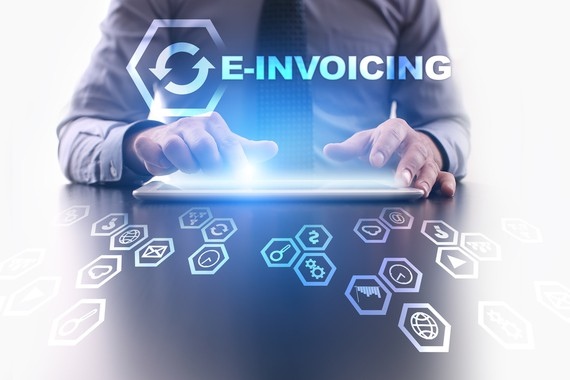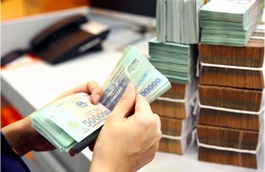Breakthrough in cross-border taxation policy
Breakthrough in cross-border taxation policy
There are positive signs being seen after the completion of the policy and tax administration framework in the field of cross-border e-commerce.
Illustrative photo. |
This will create a breakthrough in reform when it achieves the dual goals simultaneously of creating an impetus to promote the transformation of resources for the economy, as well as make up for the huge shortfall in the state budget of the country.
Electronic invoicing
A representative of the General Department of Taxation, under the Ministry of Finance, said that after eight months of implementation of a pilot plan in November 2021, the electronic invoice program, or e-invoicing, showed very positive results. As of 24 May, the country had registered 764,314 enterprises, accounting for 92.6% of the total number of operating enterprises, and 52,778 business households and individuals also registered to convert to e-invoicing of taxes. The number of e-invoicing tax accounts that authorities have received and processed is more than 318 million so far. The operating capacity of the portal system to handle e-invoices is evaluating very well, and it is expected to process 6.5 to almost 7 billion e-invoicing accounts per year on an average.
Therefore, it is expected that the goal for all taxpayers in the country to switch to using e-invoicing will certainly be achieved by 1 July 2022. This result not only has the value of being streamlined in terms of procedures, fast in methodology, and cost-saving and timesaving for taxpayers, but also has important implications for the application of digital transformation in tax administration, ensuring a steady revenue for the state budget.
Along with the financial and banking system, the tax system is considered to be the most important for the community at large, because by digitizing the tax system it will create an impetus for other fields to follow suit. In fact, there is no field that has a common denominator which is the same as the tax sector. Because this is a field that is both inclusive and a focal point related to all industries and fields, for state administrative agencies, the business community, and business individuals.
Therefore, the application of e-invoicing plays a strong role in promoting the construction, integration, connectivity, and sharing of key national database, such as the national database on population, enterprises, social insurance, and land. Furthermore, it also creates momentum for building a digital ecosystem, renovating state management in many sectors and fields, and promoting the development of a digital governance which is a move towards a digital economy, a digital society, and digital citizenship.
Cross-border taxation
A fact that was recently highlighted by users of the social network site Facebook or newly named Meta, is that Facebook announced that starting from 1 June there will be an additional fee of 5% for Facebook advertising services so as to pay tax to the Vietnamese tax authorities.
This move took place after the General Department of Taxation announced that the electronic portal for overseas suppliers (Etaxvn.gdt.gov.vn) deploy the electronic tax application on the mobile device platform (e-Tax Mobile) in order to remove obstacles in the legal framework that have existed for many years. This will compel cross-border businesses operating in the B2C model to pay tax on revenue from transactions with individual Vietnamese customers. With the above application, the tax payment procedures of these enterprises will be made simpler and easier.
This is seen as an important step in collecting enough cross-border service tax. From 21 March, cross-border businesses can register, declare, and pay taxes completely online. Vietnamese regulatory agencies can then fully grasp relevant information and data about transactions with Vietnamese organizations or individuals. This will encourage cross-border businesses as well as their customers in Vietnam to declare transactions and pay higher taxes.
Earlier this year, the Ministry of Finance said that the tax agency had collected about VND 5,000 bn from e-commerce activities, including from cross-border businesses. Now, for the first time, tax authorities can collect tax money from these businesses, which for several years have been doing solid business in Vietnam. Google and Facebook are among many technology companies that have avoided paying tax in Vietnam since the start of their operations.
Source of revenue
A tax expert assessed this issue, saying that currently the structure of Vietnam's budget revenue has changed significantly. He pointed out that specifically, revenue from import and export activities is decreasing sharply because Vietnam participates in many FTAs with regulations on tariff reduction, so it will have to gradually shift to domestic revenue. Among domestic revenues, tax revenue accounts for the largest proportion.
Therefore, the shift to expanding the domestic tax base is in line with international practice. The problem is that the tax policy must cover all sources of revenue, improve the role of regulations, and review the taxes currently applied to each specific field to ensure fair revenue, and more revenue for profitable sectors. Disproportionate tax contributions is a typical example of an ongoing problem.
Mr. Nguyễn Văn Phụng, Director of the Large Corporate Tax Department under General Department of Taxation, said that many foreign enterprises such as TikTok, Google, Bloomberg, and Facebook have provided services to the Vietnamese market in a cross-border manner with income generated in Vietnam. Previously, these businesses pushed all tax obligations onto the Vietnamese side, so they have not yet collected tax from transactions between cross-border businesses and customers who are individual users in Vietnam. Now, the situation will be very different.
In previous years, on an average, tax authorities only collected around VND 1,000 bn from cross-border e-commerce activities each year. However, the amount of tax collected from these enterprises will now increase sharply in coming years when there will be a new mechanism and effective tax collection tools. Since the e-commerce market in Vietnam is growing strongly, this will be a significant addition to the general state budget of the country.






















